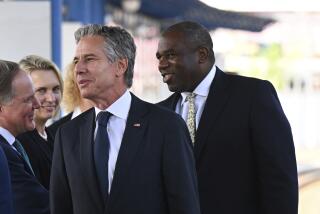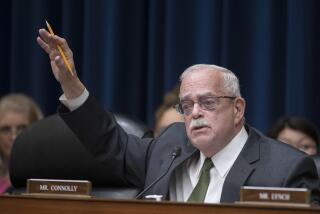Top Hussein Deputy Escapes Grenade Attack
- Share via
CAIRO — The highest-ranking deputy to Iraqi President Saddam Hussein escaped assassination from two grenades hurled as he emerged from his car during a visit to a Shiite Muslim holy site south of Baghdad, Iraqi media reported Monday.
The Sunday morning attack was the most serious assault on a senior regime figure in Iraq since the December 1996 attempt on the life of Uday Hussein, the president’s powerful son. This time, assailants struck at Izzat Ibrahim, who as vice chairman of the ruling Revolutionary Command Council is the No. 2 figure in the Iraqi hierarchy.
According to news reports, Ibrahim was uninjured, but his bodyguards and several civilians were hurt.
The attack occurred at an extremely sensitive moment for the Iraqi government, when it is still bracing for a possible U.S. military strike in a dispute over cooperation with U.N. arms inspectors. That may explain why state media waited nearly 36 hours to make the attack public.
It also came on the eve of a meeting in London between a British Foreign Ministry official and representatives of 16 Iraqi opposition groups, marking moves by Washington and London to work more closely with Hussein’s enemies in exile.
Although unsuccessful, the attack was “a clear signal the opposition is deep inside Iraq, even around the inner circle,” said Hamid Bayati, the London representative of the main Shiite opposition to the Iraqi regime.
He predicted that the attempt would undermine Hussein’s rule. “A regime that can’t protect its people can’t control the country,” he said.
The assassination attempt itself was not discussed at the London meeting, participants said, apparently because British officials and opposition groups were unaware of it.
“At the moment when the vice chairman was getting out of his car to greet a large crowd that had come to welcome him, two hand grenades were thrown at him,” the Iraqi News Agency said. A terse dispatch about the “cowardly” crime also was read on Iraqi television.
There was no word that anyone had been arrested or any explanation for how the attacker might have escaped despite the heavy security that usually surrounds government officials. INA said only that an investigation had begun.
Ibrahim came to the holy city of Karbala for a ceremony marking the birthday of the Prophet Muhammad’s grandson, Imam Hussein, who is particularly venerated by Shiite Muslims. The attack took place at 10:20 a.m. near the imam’s mausoleum, a hallowed pilgrimage site for Shiites from Iraq, Iran and Lebanon, and therefore nearly always crowded with faithful.
Ibrahim--who has been Hussein’s deputy since the Iraqi leader took over as president in 1979--was able to go ahead with his planned speech, delivered on behalf of the president.
There were no immediate claims of responsibility. However, the fact that the attack occurred in Karbala suggested that the assailants may have been Shiite Muslims.
Sixty miles south of Baghdad, Karbala was the scene of bloody fighting in March 1991, when Iraqi Republican Guards crushed a Shiite uprising in the aftermath of the Persian Gulf War.
Opposition figures claim that hundreds, or even thousands, of people were killed around the city’s central mosque. Many buildings were leveled in intense fighting, and reconstruction was completed only a few years ago.
Given such a history, Karbala is “not a city where representatives of the regime are welcome,” said Nabil Musawi, an official in London of the Iraqi National Congress, an umbrella organization for those seeking to overthrow Hussein.
Opposition groups in London denied that they were responsible for the attempt on Ibrahim. Musawi said his group considers such efforts “irrelevant . . . unless you can get to Saddam Hussein. The rest are puppets.”
He dismissed Ibrahim--who is also deputy commander of the armed forces--as “Saddam’s shoe.”
“If this does anything, it reflects that the security system is not as tight as Saddam would like us to believe.”
Organized internal opposition is almost impossible in Iraq, given the iron grip of Hussein’s security apparatus.
The Iraqi opposition in exile for years has been struggling to mount a credible threat to the regime. But the groups have been hampered by their own disunity and by the hot-and-cold nature of the support they have received from the West.
In the current crisis with Iraq, however, President Clinton and British Prime Minister Tony Blair are showing fresh interest in the opposition groups.
U.S. Assistant Secretary of State Martin Indyk, who heads the department’s Near East bureau, was due to meet with the opposition groups today in London, one day after they had met with the British. The high-profile meetings are part of a policy shift on the part of the United States and Britain from depending solely on economic sanctions against Iraq to supporting anti-Hussein groups.
Congress has approved allocating $97 million in military equipment and other resources to the dissidents, but Derek Fatchett, a deputy minister in the Foreign Office, said Britain was not ready to give such aid. “We need to see their proposals before we can see what kind of support we can give,” he said.
He insisted that Britain was not trying to topple Hussein, adding, nonetheless: “It is almost impossible to argue that Iraq without Saddam Hussein would not be a better country.”
A new regime, he added, “would have to be better for the ordinary people of Iraq.”
The opposition groups who met with Fatchett agreed on the need for an international tribunal to try Hussein for genocide, torture and war crimes.
Iraqi officials tend to be dismissive of the opposition, calling them terrorists and traitors.
Iraq’s U.N. ambassador, Nizar Hamdoun, said the U.S. and British governments would achieve nothing by cooperating with the exiles. “It’s only a waste of time and effort,” he said in an interview on CNN.
Daniszewski reported from Cairo and Miller from London.
More to Read
Sign up for Essential California
The most important California stories and recommendations in your inbox every morning.
You may occasionally receive promotional content from the Los Angeles Times.













